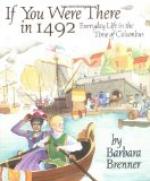Columbus was not an avaricious, nor a cruel man; and certainly he was a very pious one; but early in life he had made voyages along the coast of Africa, and he was accustomed to a slave trade. Moreover, he was anxious to reduce the expenses of these Indian possessions to the Catholic sovereigns, to prove himself in the right as to all he had said respecting the advantages that would flow to Spain from the Indies, and to confute his enemies at Court.
Those who have read the instructions to Columbus given by the Catholic monarchs will naturally be curious to know how the news of the arrival of these vessels laden with slaves, the fruit of the admiral’s first victory over the Indians, was received by the Sovereigns, recollecting how tender they had been about slavery before. This, however, was a very different case from the former one. Here were people taken in what would be called rebellion—prisoners of war. Still we find that Ferdinand and Isabella were heedful in their proceedings in this matter. There is a letter of theirs to Bishop Fonseca, who managed Indian affairs, telling him to withhold receiving the money for the sale of these Indians that Torres had brought with him until their Highnesses should be able to inform themselves from men learned in the law, theologians and canonists, whether with a good conscience these Indians could be ordered to be sold or not. The historian Munoz, who has been indefatigable in his researches amongst the documents relating to Spanish America, declares that he cannot find that the point was decided; and if he has failed, we are not likely to discover any direct evidence about the decision. We shall hereafter, however, find something which may enable us to conjecture what the decision practically came to be.
Distress of natives.
Many of the so-called free Indians in Hispaniola had, perhaps, even a worse fate than that which fell to the lot of their brethren condemned to slavery. These free men, seeing the Spaniards quietly settling down in their island, building houses, and making forts, and no vessels in the harbour of Isabella to take them away, fell into the profoundest sadness, and bethought them of the desperate remedy of attempting to starve the Spaniards out, by not sowing or planting anything. But this is a shallow device, when undertaken on the part of the greater number, in any country, against the smaller. The scheme reacted upon themselves. They had intended to gain a secure though scanty sustenance in the forests and upon the mountains; but though the Spaniards suffered bitterly from famine, they were only driven by it to further pursuit and molestation of the Indians, who died in great numbers, of hunger, sickness, and misery.
Spanish commissioner.
About this period there arrived in the Indies from the Court of Spain a Commissioner of Inquiry, his mission being doubtless occasioned by the various complaints made against the admiral by Father Buil, Margarite, and the Spaniards who had returned from Hispaniola. The name of this commissioner was Juan Aguado, and his powers were vouched for by the following letter from the sovereigns:—




